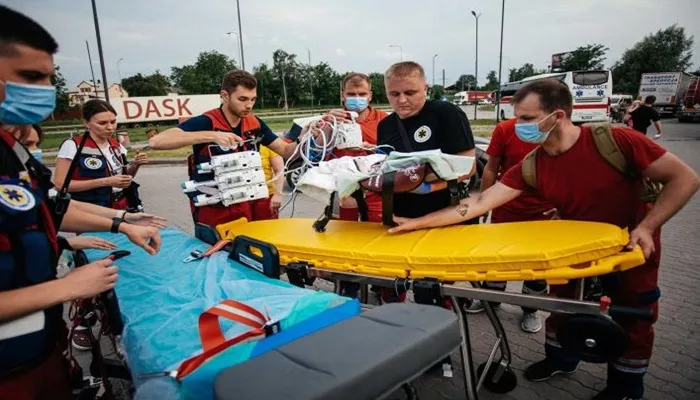Sofiia, born with short bowel syndrome and oesophageal atresia, a rare condition that prevents proper digestion, faced a difficult start in life. By four months old, she had undergone multiple surgeries at Kyiv’s Okhmatdyt Children’s Hospital, the only place in Ukraine capable of treating her complex conditions.
But on July 8, 2024, a Russian missile strike devastated the hospital, which had already been damaged by ongoing attacks on Ukraine. The strike left the facility in ruins, killing two people and injuring many others. Sofiia, who was on oxygen support at the time, and hundreds of other children in need of urgent care were left without medical assistance.
Halyna, Sofiia’s mother, recalls the fear and helplessness she felt. “It was very hard and scary. You stand and cry, not knowing what to do,” she says. “Especially with a sick child in your arms.”
In the wake of the attack, the EU-supported medical evacuation (Medevac) programme stepped in to help. This initiative, supported by the EU Civil Protection Mechanism and WHO, quickly coordinated the transfer of 12 of the sickest children to hospitals across Europe for continued care.
Since its launch in 2022, the Medevac programme has assisted more than 4,000 Ukrainian patients, offering critical medical services such as trauma and cancer treatment, rehabilitation, and prosthetic care in hospitals throughout Europe.
Sofiia’s journey to safety was fraught with challenges. After the attack, she and her mother were forced to take shelter underground. The baby soon developed pneumonia, and her condition worsened. To stabilize her, Sofiia was intubated and sedated for the more-than-24-hour journey that began on July 17.
The trip began with a convoy of ambulances traveling from Kyiv to Lviv, and then across the border to Rzeszów, Poland, where an EU Medevac Hub provided continuous medical care. From there, a specially equipped aircraft, co-funded by the EU and Norway, flew Sofiia and other children to Germany. The pilot kept the plane at a low altitude to avoid putting stress on Sofiia’s delicate lungs, making the journey especially risky.
“I was told she might not survive the trip, but I was hopeful that she would have a chance,” says Halyna. Thankfully, Sofiia arrived at Stuttgart’s Olga Hospital, where she received the care she desperately needed and underwent several surgeries.
Now 10 months old, Sofiia is thriving. She can play with toys, roll over, and has even grown two teeth. In the coming weeks, she is expected to be discharged from the hospital and, if all goes well, will return to Ukraine.
Halyna is deeply grateful for the Medevac programme. “There aren’t enough words to express my thanks. It literally saved my child’s life,” she says. “I am forever grateful to everyone who helped us.”
The EU’s Medevac programme, coordinated through the European Commission’s Emergency Response Coordination Centre, continues to be an essential service for Ukrainian patients in need of urgent medical care. The programme will remain in place as long as needed, providing critical support to Ukraine’s healthcare system during these difficult times.
Related topics:


